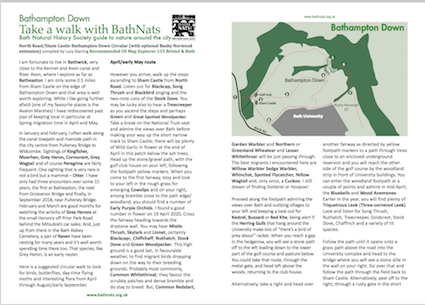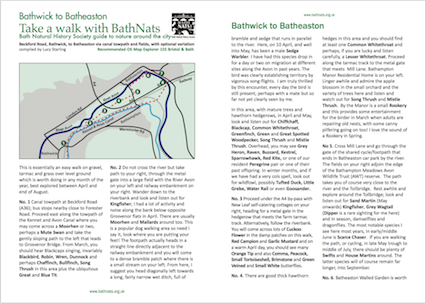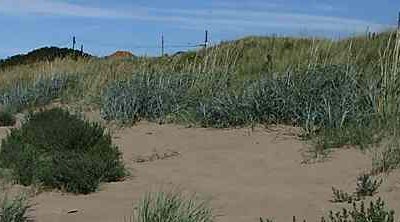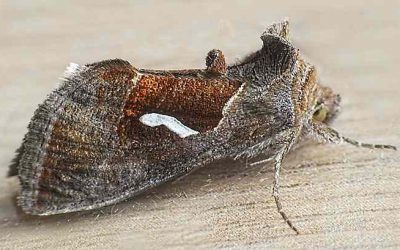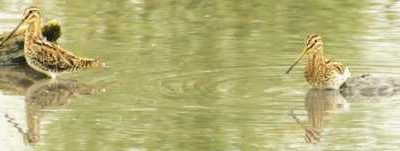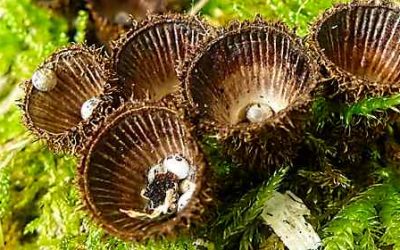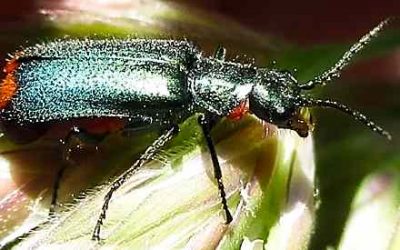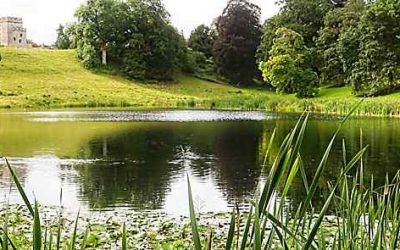Bath Natural History Society
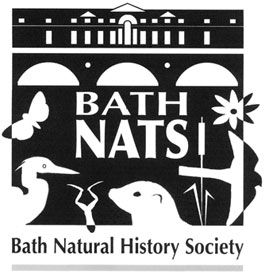
BATH NATURAL HISTORY SOCIETY – Registered Charity No. 1107468
![]() Follow Bath Naturewatch on Facebook and Twitter
Follow Bath Naturewatch on Facebook and Twitter ![]()
Welcome to our Bath Nats website from the President
Do come and join us in “Exploring Nature within and around Bath!”
Whether you are visiting this site as an onlooker, member or prospective member of our Society, we hope you will enjoy and be excited by the descriptions and illustrations of our diverse interests, activities and expertise. We are a relatively small Natural History Society, which relies on the enthusiasm, voluntary efforts and skills of its membership, so newcomers – of all ages and from all kinds of background are always very welcome.
We think that ‘natural history’ is important for everyone, not just a select few. The natural world is made up of many different kinds of animals and plants, and it takes all kinds of people to appreciate them, from different points of view and in different ways. So, if you find pleasure in exploring any aspect of nature, especially in the Bath area, perhaps you would like to join us as a really great way to share and learn more.
Since I moved to Bath in 1969 there have been many changes, but the city and its surroundings have always supported a great variety of wildlife. The hill pastures are not as rich in wild flowers and butterflies as they once were, but with the move to more sustainable agriculture this situation should improve. Global warming has resulted in some new arrivals in our area. Among my favourites are the Ivy Mining Bees that have recently colonized sandy banks near the Pavilion Restaurant in Victoria Park. The night time roosts of Pied Wagtails in the Southgate area help to brighten the dark days of winter. They prefer the younger trees where they are safer from the attentions of the local Sparrowhawks, so they tend to move their roost site as the trees get too big. Birds of prey were much persecuted in the past but the Buzzard recovered its numbers many years ago, our resident Peregrines on St. John’s Church are now well established, and Red Kites are now often seen in the surrounding countryside.
By joining in with us, you too might be surprised and inspired by the variety of life that can be found almost anywhere in and around Bath, with a little knowledge of where to look, how to look and what to look for. Over the past few years some of our members have regularly visited the tiny cemetery at Smallcombe to find out what lives there. The results have been astonishing. So far they’ve seen over 700 species including 55 kinds of moths, many other insects, over 44 common bird species, around 144 kinds of flowering plants including some quite rare species, and over 100 species of lichens. All this occurs within a short walk from the city centre. The canal too is rich in species. Around 15 dragonfly species can be seen along the towpath between Bath and Bradford on Avon. Kingfishers can frequently be seen and if you are lucky you might even see an otter on the canal or along the River Avon. Delightful mosses, liverworts, lichens and all manner of ‘creepy crawlies’ abound on and in our stone walls and in our local woodlands – not to mention fungi, a passion for some of our members. Fungal forays are remarkably popular. We are also discovering, by light trapping (and releasing), the wide range of moth species which inhabit Bath’s urban and sub-urban areas, including some of the strikingly beautiful hawk moths.
We are especially keen to work in partnership with other local educational groups and organizations who share our interest in and concern for the natural world, and to find ways of reaching out to members of the wider public, including young people and families. When you join us, you don’t just get a chance to attend our own varied programme of outdoor and indoor meetings, and receive our Magazine, Newsletter and other publications – you also get to know about what our partners and friends are doing and how to join in with them.
You are very welcome!
About Us
Objectives
The main purposes of Bath Natural History Society are to promote an interest in all aspects of natural history and to encourage the study, conservation and recording of the fauna and flora of the Bath area. BNHS liaises with other natural history societies and conservation organisations.
Activities
• Field trips – usually two or more per month.
• Indoor meetings – monthly from September through to April.
• Survey work – site visits to record specific wildlife groups.
• Members’ slides and social evenings.
• Education – providing lecturers to speak to external organisations.
• Wildlife identification.
• Meetings to enable the public to participate in Nats’ activities.
Join in
If this sounds interesting to you, come and join us!
To download Constitution Council Members for 2024 SafeGuarding Policy Membership form
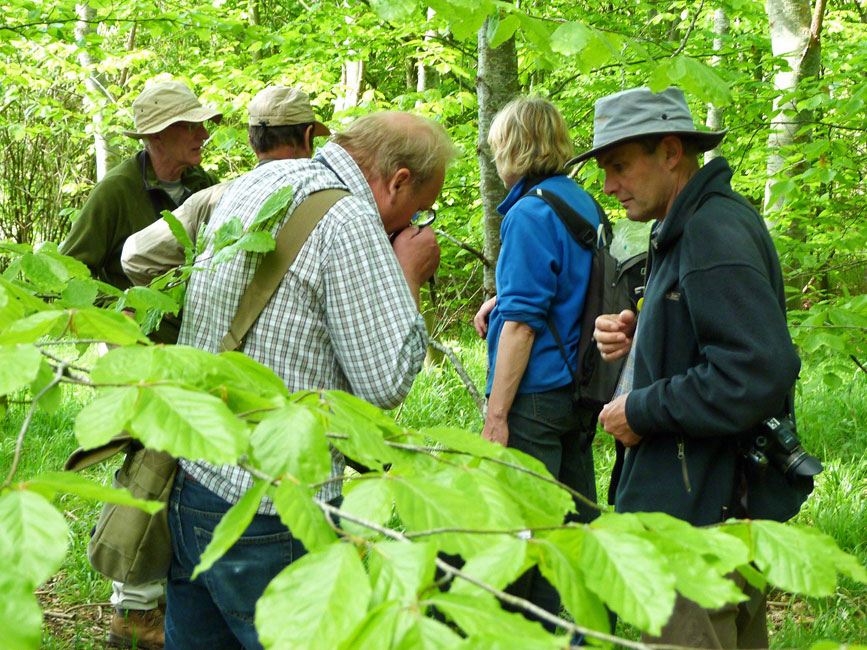
Take a walk with BathNats
When it’s not possible to join a field trip, explore nature round Bath with a self-guided walk. Lucy Starling is your guide.
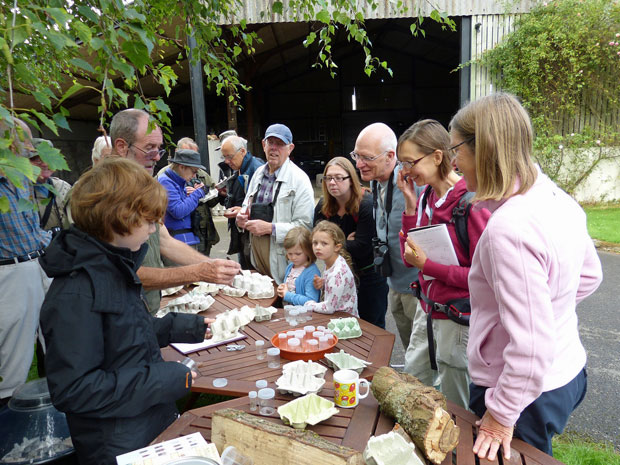
How To Join Bath Nats
To join us, come along to one of our indoor meetings, email us or download an application form
A programme of our field trips is available to all members.
The annual subscription is as follows:
• Single membership…….. £8.00
• Family membership….. £12.00
• Student membership….. £4.00
You can download an application form to join us here
Admission for indoor meetings is £3 for members and visitors.
Admission to the social evening and to the AGM is free.
Study Groups
‘Study Groups’ (SGs) are intended to augment the main Field Programme by enabling members of the Society to enhance their knowledge and confidence in studying particular aspects of natural history and to encourage recording.
Their meetings are arranged and notified separately to their members by their respective leaders, as and when appropriate. Members who wish to join an SG are asked to contact the leader(s) of that group.
Current SGs are as follows:

Biodiversity
Moths (cllck to read more...)
For members with a special interest in moths and for those who would like to learn more. A programme of moth trapping is held at various venues, usually people’s gardens, circulated in advance and covering the period April to October. There are also many extra traps held at shorter notice, depending on weather and conditions. In season there is also an active email exchange of photos, comments, queries and information.
For those new to moth trapping, traps basically consist of a bright light to attract moths and a container inside which the moths settle on egg boxes. Traps are set up as darkness falls and many moth groups stay with the trap into the small hours to record the species which come to the light, either to enter the container or to fly off again. The Bath Nats approach is to leave the light and container overnight and open it the next morning, usually around 9.00 am.
Moths are then carefully removed for species identification and recording before being passed around for members present to see them. Once the moths have been examined and in some cases photographed, they are placed on nearby foliage so that they can fly off as and when they please.
Nature round Bath
Learn more about the natural history of Bath in the first of a series of studies, including extracts from the Bath Natural History Society Magazine.
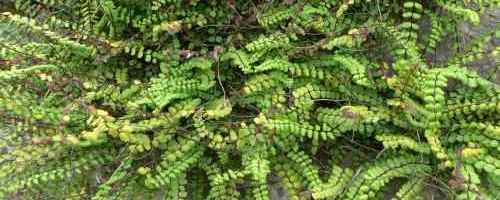
Strandline plants and dune formation: talk by Rob Randall, 4 December 2023
Presidential address Sand dunes represent one of the few natural habitats in Britain, although few have developed without intervention. There are sand dunes on the Somerset coast around Weston-super-Mare, Berrow and Brean: Rob focused his talk on Sand Bay, just north...
Moth report for 2023
above: Dewick’s Plusia, a new county record © Mike Bailey 2023 has seen an active season for the Bath Nats Moth Study Group. Overnight temperatures are of interest to us as warmer conditions generally result in higher catches in the moth traps and are reflected in the...
Wrong sort of bees: illustrated talk given by Steve Smailes, 9 October 2023
Steve Smailes’ illustrated talk picked out some key species of solitary, mason, and mining bees in contrast with the social Honey Bee, Apis mellifera. About 250 species of bee do not produce honey and will colonise a bee hotel. Queen Honey Bees may live for several...
Charmy Down, 23 September 2023
Leader: Rob Randall Three members joined the leader on a blustery day, to look for late season insects and grassland fungi. It was sunny as the party ascended via Charmydown Lane. Ivy Bees, Drone-flies and other insects were feeding on the Ivy flowers and Red Admirals...
Kenfig Report, 8 July 2023
BNHS and RSPB at Kenfig Pool © Andrew Harrison Leader: Rob RandallThe coach trip to Kenfig was made in the rain but on approaching our destination the weather brightened. After disembarking the party made for Kenfig Pool, the large lagoon at the rear of the dunes....
Slimbridge 11 October 2023
Snipe on Rushy Pool, Slimbridge © Andrew Harrison Leaders: Lucy Starling and Phillip Delve For this joint Bath Nats and Bath RSPB Field Trip 11 RSPB/Nats members and one non member joined Phillip and me for a stroll around Slimbridge on a grey morning and afternoon....
Fungal Foray at Lord’s Wood, 27 September 2023
above: Fluted Bird’s Nest (Cyathus striatus) © Helena Crouch Leaders: Alan Rayner and Helena Crouch Fourteen members assembled at the entrance to Lord’s Wood, just south of Pensford, for an eagerly anticipated fungal foray. Lord’s Wood is located on the Pennant...
Members’ Evening: Alvan White & Rob Randall, 5 September 2023
above: Malachite Beetle (Malachius bipustulatus) © Rob Randall Due to unforeseen developments the number of speakers was reduced to just Alvan White and Rob Randall. However they had more than enough material to interest the small gathering. This created a relaxed...
Langford Lakes and Bratton Camp, 21 August 2023
Leader Tom Rogers Ten members plus two guests joined the leader at Langford Lakes. The weather was dry & warm with bright sunshine. On arriving in the village I was met by a single Red Legged Partridge walking in the middle of the road. Then on entering the...
Newton St. Loe & Wilmington, 26 Aug 2023
Leader Richard Bottle Six of us met at Newton St. Loe Parish Church for a walk through the lovely grounds of Newton Park, landscaped by Capability Brown and now the home of Bath Spa University. Our route took us along the Newton Park Lakes, through Melancholy Wood and...
National Links
- RSPB www.rspb.org.uk
- Natural England www.naturalengland.org.uk
- National Trust www.nationaltrust.org.uk
- Wildfowl & Wetlands Trust www.wwt.org.uk
- Butterfly Conservation www.butterfly-conservation.org
- British Dragonfly Society www.dragonflysoc.org.uk
- UK Moths www.ukmoths.org.uk
- Froglife www.froglife.org
- Wild About Britain www.wildaboutbritain.co.uk
- UK Butterflies www.ukbutterflies.co.uk
- The Great Crane Project www.thegreatcraneproject.org.uk
- Botanical Society of Britain & Ireland www.bsbi.org.uk
Local Links
- Bath peregrines nest cam (Hawk & Owl Trust) hawkandowltrust.org/web-cam-live/bath-1
- RSPB Bath Local Group ww2.rspb.org.uk/groups/bath
- Avon Wildlife Trust www.avonwildlifetrust.org.uk
- Wiltshire Wildlife Trust www.wiltshirewildlife.org
- Somerset Wildlife Trust www.somersetwildlife.org
- Gloucester Wildlife Trust www.gloucestershirewildlifetrust.co.uk
- Cotswold Fungus Group www.cotswoldfungusgroup.com
- Bristol Regional Environmental Records Centre www.brerc.org.uk
- CVL Birding www.cvlbirding.co.uk
- Severnside Birds www.severnsidebirds.co.uk
- Somerset Birds www.somersetbirds.net
- Bristol Naturalists Society www.bristolnats.org.uk
- Bristol Ornithology Club www.boc-bristol.org.uk
- The Birds of South Gloucestershire www.thebirdsofsouthgloucestershire.co.uk
- Wiltshire Birds www.wiltshirebirds.co.uk
- Chew Valley Ringing Station www.chewvalleyringingstation.co.uk
- Elm Farm www.elm-farm.com
- Blagdon Lake Birds www.blagdonlakebirds.com
- Somerset Rare Plants Group www.somersetrareplantsgroup.org.uk
Get In Touch!
Please use the contact form here
BATH NATURAL HISTORY SOCIETY
Registered Charity No. 1107468
In memoriam
Tributes to past members
Rob Randall 1948 - 2024

Rob Randall © Matt Williams
Rob Randall came to Bath as a student while the University of Bath was being built at Claverton. He worked in computing in Bath for many years and was also a highly respected naturalist. He served as a recorder for the Botanical Society of Britain and Ireland, and became a nationally recognised expert on the brambles of southern England. He supported Bath Natural History Society over many years as a leader of field trips, lecturer and council member, and was President from January 2022 till his death. He also devoted three decades as a volunteer for Bath Royal Literary and Scientific Institution in Queen Square where he built its database and indefatigably catalogued its collections of fossils, important natural history records dating back to early Victorian times, valuable books, historical artefacts and archives.
Rob was always willing to share with others his enthusiasm for and knowledge of the countryside around Bath, which was unrivalled. His generous, quiet, thoughtful, but always considerate presence will be widely missed.
David Ian Robertson 1943 - 2022
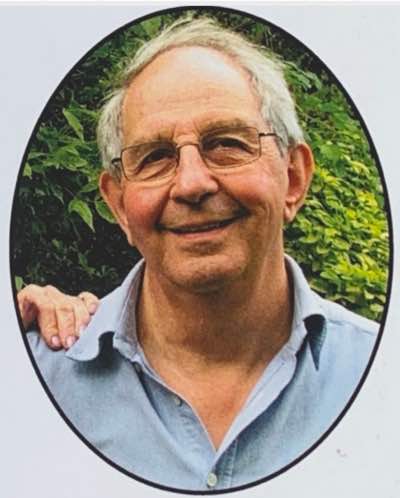
David Robertson
We were sad to lose BNHS member David Robertson in September 2022. David studied engineering at university and spent his working life as a civil engineer, including working on the Channel Tunnel. He even built his own house.
He had many and varied interests, including a love of nature. He was a keen bird watcher, both in the UK and around the world. For many years, he was a RSPB member, and made an important contribution both at local level, for almost nine years as Local Group Leader and nationally, as Group Volunteer Consultant.
David was a swift nestbox champion. He was instrumental in heading the first ever survey of breeding swifts in Bath and established close links with officers of BANES for the better protection of both swifts and other building-dependent birds. He sourced charitable funds that enabled over 100 swift nest boxes to be installed by Bath residents. He gave many talks to local schools and societies about the problems facing summer migrants.
David’s love of nature was also evident in his bee-keeping; his willingness to host moth traps for BNHS; his paintings, etchings and sculptures of birds and other wildlife.
David will be fondly remembered and appreciated for his calm, friendly and approachable character, as well as for his many skills. Many of us were pleased to be able to see him and his wife, Jan, at the BNHS 80th Anniversary Exhibition and drinks evening, in October 2021 at BRLSI.
Richard Pooley: President January 2002-January 2005
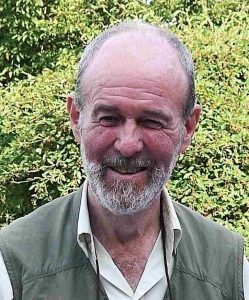
Richard Pooley © Lis Allen
Richard Pooley died on 30 April 2022, aged 83 years.
I got to know Richard while attending Bath Natural History Society indoor and outdoor meetings. My father and I sat next to him in the old Bath Technical College theatre and fell into conversation. Richard was very generous in sharing his knowledge with any person who, like him, had a deep interest in wildlife. He acted as a field trip leader on many occasions and showed his wildlife slides at the then annual Members’ Evening. With his wife Liz and three children, he lived in Meadow Park, above Batheaston, overlooking, in the distance, Brown’s Folly. Richard chaired The Somerset Trust for Nature Conservation from the time the Trust purchased the site and he later chaired the local group of Avon Wildlife Trust, acting as the main Warden for the reserve, taking part in many years of site management. Beyond attending Bath Nats meetings and events, I became part of a group of, primarily, birders, exploring various nature reserves, often in Dorset and Wiltshire, sometimes on a “twitch” which Richard invariably organised.
In the 1980s Richard’s work meant a move to Devon, and then to Portugal for a number of years before he returned to England and with Liz, set up home in Rudloe, near Corsham. Not unsurprisingly, Richard again became involved in the management of AWT Brown’s Folly, re-joined the Society in 2000 and became reacquainted with his Bath Nats fellow naturalists and members of the Bath and District RSPB Group which he also re-joined. Richard was honoured to be invited to become President at a time when the Society celebrated its 60th anniversary in 2002. During his Presidency, the Society established a website and Skills Improvement Groups were set up, in addition to the normal field programme, for the further study of fauna and flora including moths and moth trapping, which Richard, now an active member of Butterfly Conservation Wiltshire Branch, presided over for many years. Richard became very skilled at moth identification, including micro moths, trapping regularly at home and taking his trap to other locations in the Bath area, including Elm Farm. He also acted as Nats Moth Recorder, submitting his records including some significant species as well as verifying records submitted by other Society members.
Richard served three years as President, then acted as a Vice President and also for a time as Newsletter Editor. He regularly submitted records of birds, butterflies, dragonflies and plants he found the Bath Nats recording area and gave illustrated talks to the Society and other local organisations.
Our past magazines, most recently covering his last 22 years, are a testament to how much Richard actively supported the Society and his enjoyment of the natural world, both at home and abroad, and in very generously sharing his enthusiasm and knowledge with others. This he did until only some four months before he died, attending the moth group annual gathering in Compton Dando in February 2022, showing us photographs of moths and “mothers”.
Lucy Starling
President January 2008-January 2012
Professor Desmond Thomas Donovan 1921-2019
We are sad to learn that Professor Donovan died on 23rd December 2019 after a short illness. Members of the Society will know him as one of our Honorary Members. In fact he was one of the Founder Members of our Society in 1941 as an undergraduate studying Geology at the University of Bristol. He had a distinguished career as an academic geologist, first as a lecturer at the University of Bristol, then in 1962 Professor of Geology at the University of Hull, after which he became the Yates Goldsmid Professor of Geology at University College London from 1966 to 1982. After that he returned to the West Country and became Hon. Curator of the Wells Museum from 1982-85 and has lived in Wells since then. His main speciality has been in the field of palaeontology, particularly Jurassic cephalopods, a subject in which he made a massive contribution to our knowledge and understanding.
As one of his former students, I was pleased to receive a letter from him last year in which he congratulated the Bath Nats on our activities saying, “it seems to flourish and the annual magazine is excellent”. It was a nice tribute from a founder member after eighty years! He told me he was, “still doing some geology and had a couple of papers in preparation!”
The Society is greatly indebted to Professor Donovan for his foresight as one of our founder members.
David Goode
Alan Barrett 1937-2020
Our dear friend Alan Barrett died in February 2020 aged 82. Alan and Gillian joined the Society in about 1991 shortly after moving to Bath from Great Bookham in Surrey. Alan brought with him a considerable knowledge of birds, and a developing interest in insects. Gillian tells me that Jean Matthews, who was then Dragonfly Recorder, took him under her wing and he became very interested in dragonflies. Eventually he took over from Jean as Dragonfly Recorder for the Society. He gave several talks to the Bath Nats and led trips to help people identify dragonflies. One of Alan’s favourite places locally was the ox-bow wetland at Bathampton Meadows. He became the warden of the nature reserve run by the Avon Wildlife Trust and often took members of the Skills Improvement Group there.
Alan also became interested in Grasshoppers and Crickets and became the Recorder for these too. He went with Gillian on a residential course on Grasshoppers and Crickets at Kingcombe Field Study Centre in Dorset which stimulated his interest even further. All the records from the ‘SIGs’ were sent to BRERC in Bristol.
Over the years Alan has been central to the development of the Society. Whilst on Council he played an important part in writing the Constitution when we were about to become registered as a charity. All this was done in parallel with his other great interest which was birds. He has given enormous support to the Local Group of the RSPB in Bath over many years. In 1998 he became Indoor Meeting Secretary and in 2003 became Group Leader, a position that he held for ten years. Alan kept abreast of the changing fortunes of birds in Widcombe, and particularly in their own garden where Alan and Gillian have recorded nearly fifty species.
I shall always remember him as a great enthusiast, who was always willing to spend time explaining the detailed characters of a particular bush cricket or long-winged conehead. He had a great knack using a bat detector for identifying stridulating insects. But above all it was his welcoming friendliness that I shall miss.
David Goode
Tom Cairns 1949-2017
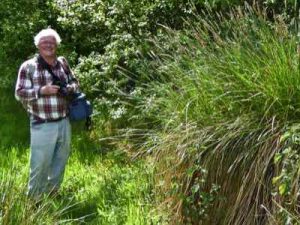
Tom Cairns 1949-2017
Ole Thomas Cairns was born on 8th June 1949 in Germany to his Norwegian mother and Northern Ireland-born father.
The family moved to Northern Ireland, then to Norfolk and later to Lower Swainswick, near Bath. It was in the local primary here that he gained his passionate love of nature and the countryside which stayed with him so strongly all his life.
After school he took a BSc Course at Bath, and became involved in conservation whilst working for the Bath Preservation Trust, saving a row of Georgian workers’ cottages from demolition by the less than enthusiastic City Council.
Return visits to Norway furthered his love of nature and he would go for solo walks out into the wild.
He took one of the first Master’s degrees in conservation and commuted from his house in Widcombe to Westminster where he advised the Government on the Wildlife and Countryside Act, a major piece of legislation. Other positions included project managing the Albert Dock in Liverpool whilst working for the Civic Trust.
Moving to Devizes he took up a post with Wiltshire Wildlife Trust, an organisation with which he became involved to the end, and where he made so many good friends.
He also worked for the Grazing Advisory Partnership based in Brinkworth, Wiltshire, organising a body including the Ministry of Defence, National Trust and Rare Breeds Survival Trust, the aim of which being the use of cattle native to the specific areas involved, to maintain the fragile ecosystem which was at risk from invasive or over-dominant species such as bracken. This is now standard practice.
In 2012, having taken up a new job in Lincolnshire, managing schemes to maintain salt marshes using native breeds, he collapsed at work and was rushed to hospital. Tests revealed that he had suffered a heart attack having contracted a disease of the heart muscle. The condition was so serious that he had to retire from work and return to his beloved Devizes. He fully recovered and made a point of enjoying life to the full.
In 2015, he was seriously injured in a road traffic accident and taken to Southmead Hospital, Bristol, where it was feared he would lose his leg. In a major operation the leg was saved.
Whilst recovering he suffered a severe flu-like illness; polymyalgia was diagnosed. Some months later tests showed that he had cancer, the illness from which he finally succumbed.
All the while Tom maintained his social life and was a great inspiration to friends and colleagues, who will continue to have happy memories of Tom.
Here are three such memories.
From Dave Green
In February 1978, Tom invited my heavily pregnant wife Ali and me to have a curry at his third-floor flat in Lansdown, Bath. We had known Tom by this time a couple years, and I knew he had photographed many flower species. Tom intended, after a leisurely meal, to show us slides of some of his flower pictures. However, as we ate, Ali was getting contractions, but didn’t say anything at the time, or when Tom and I got engrossed in the slideshow. Eventually she mentioned that contractions were coming at three-minute intervals, and perhaps we ought to go off to the hospital. This created a dilemma for Tom and me, because we were just getting to the slides of the frog orchid, which at that time I had never seen. Ali was insistent that we HAD to go, so Tom helpfully rattled through the slides at speed so that I could get a view of the plant before helping Ali shuffle down six flights of stairs. All went well and the following day the first visitor to the side of Ali’s bed was Tom with a bunch of flowers.
I have below included a photo that Tom took of the Ghost Orchid in 1978/9, one of the last times it was seen in Britain, my memory is of waiting by the car with Rob Randall until Tom ran out of film taking pictures whilst laid prone on the floor of Beech woodland, “somewhere in Southern England.
From Paul Derby
Tom had more jobs at the Wiltshire Wildlife Trust than anyone else that I can remember, often re-inventing himself to fit the job – another of Tom’s skills. He therefore had more ‘leaving dos’ than anyone else, with gifts of a new pullover on each occasion, as I recall, he was famous for his knitwear!
Tom’s wide knowledge of natural history was astounding. We would often be talking on a particular subject, when Tom would go off at a tangent about some related detail which I knew nothing about. It was always interesting and often humorous.
Tom had a vast collection of classic films on VHS, ‘I filled a room with those’ being a typical comment. He also had a complete (as far as I know) collection of first editions of the New Naturalists books. It was obvious that these gave him pleasure.
He was celebrated for his karaoke performances at parties (any excuse for a party was good enough for Tom, he knew how to enjoy himself!) His musical tastes were indeed wide and varied; many of the CDs I copied for him would be summarised by him as ‘really great, never heard them before’.
His sense of humour and fun go without saying. He often blamed me for influencing his sense of humour. He’d laugh at terrible jokes and make you feel a better person!
There are rumours of Tom’s love of cider… I never saw this, as whenever I had a drink (or two) with him, it was beer – real ale, of course. When we both lived in Devizes, we would regularly meet up in The Southgate, sit in the corner like two old codgers (which we were), and talk about anything and everything and put the world to rights. Tom always seemed to have his umbrella, whatever the weather!
From Rob Randall.
Tom had been a good friend since the 1970s. The exact date eludes me, but the occasion is cemented hard in my memory. I was out botanising in private quarry ground behind Brown’s Folly, probably looking for orchids: this was before it became a nature reserve.
I burst out of the bushes only to see a young man on hands and knees busy photographing a plant. He was also trespassing of course, so to save any embarrassment on his or my part I decided to go up and have a chat. I forget what he was looking at but I am sure the photographs were excellent. I think it was Tom who suggested I join Bath Nats.
Tom, Dave Green and I occasionally went on trips to see rare plants and I remember going to look for the Red Helleborine in a secret location on the Cotswolds. Although it was on a public right of way there was usually someone not far away guarding it. We all took our photos in time before the guard appeared and I am sure Tom’s were great but when I got home I discovered my film was stuck in the camera and I ripped it trying to extract it. Divine retribution perhaps.
Tom studied statistics while at university and I remember in those days Bath Chronicle had a quiz of some sort. Tom worked out how many entries he had to make to win and submitted them all whenever the quiz was published. After winning two times in a row, they thought perhaps he ought not to enter the competition again. Sounds a bit like what Bath council gets told if they win Britain in Bloom too many times.
We were regularly in touch from that point on and often went exploring (and sometimes trespassing) together until Tom took his job with the Civic Trust. I visited him a few times while he was based in London and occasionally after he moved to Devizes, especially while he was General Secretary for Bath Nats, but I missed those trips out to look for and photograph rarities.
Jane Fletcher 1932-2021
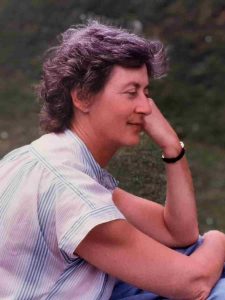
Jane Fletcher in the mid 1980s
Jane grew up on the edge of the North Yorkshire Moors where she developed a great love of nature. After training and working in Social Services for some years, she took a break and worked her way round the world, including South America, Nepal and Africa, taking various jobs as she went, including teaching English. She resumed her Social Service work on her return until her retirement but continued travelling to remote spots, such as Mongolia and the Middle East, on plant hunting holidays as well as visiting the many friends she had made, scattered across the continents.
Moving to Bath on retirement, Jane became loyal to several wildlife and musical societies as well as volunteering in museums and at Bath’s Botanical Gardens. Living alone, the Bath Natural History Society, the Hardy Plant Society and others were important to her. She often talked about the bird walks she’d had, mentioning her admiration for the birding fraternity, who knew and shared their knowledge while also being disciplined about keeping silent when birds were being watched!
Jane, a generous benefactor to BNHS, was always interested in others and was a good conversationalist, with a gentle sense of humour.

